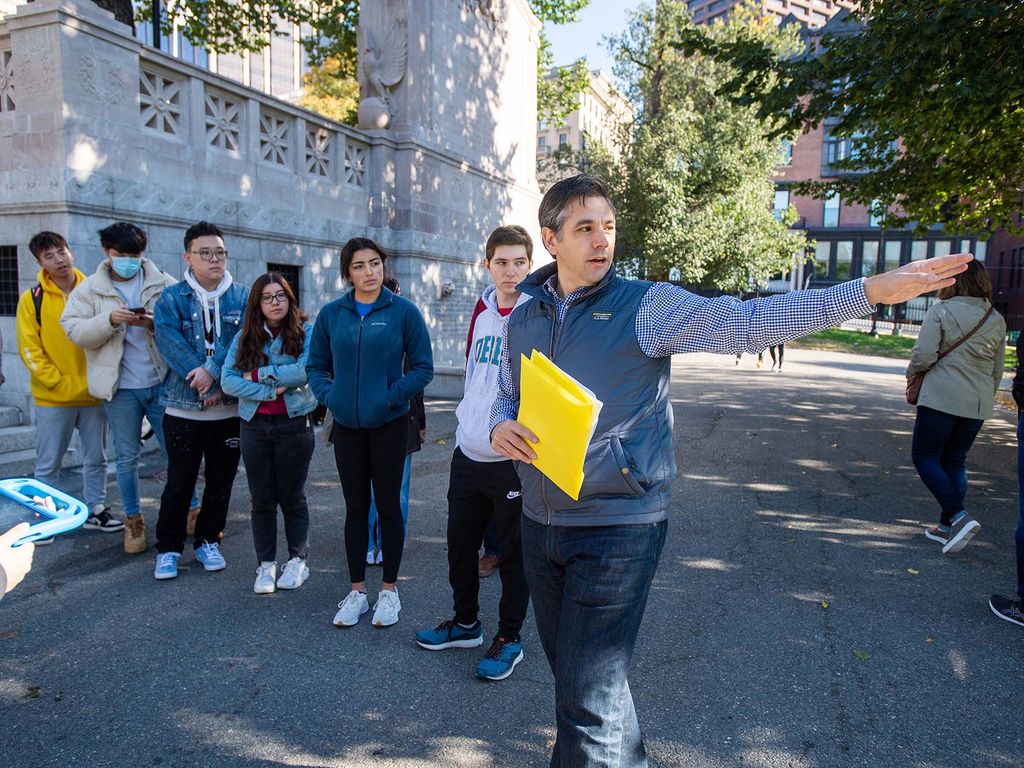Here are some facts to dispel the myths that make some nervous about majoring or minoring in History.
Myth #1: History is boring.
Maybe you had awkward experiences in high school. You assume history is going to be all names and dates and “one damned thing after another,” as the saying goes. Maybe, like Virginia Woolf, you’ve concluded that history is too much about old men and their wars or that it is “more or less bunk,” as Henry Ford proclaimed. (Then again, Ford also called physical exercise bunk, so he might not be the best authority.)
But wait… it’s not like that.
College history is not designed around state-mandated textbooks or standardized tests. Yes, like in any field, you have to remember stuff. It’s college. But the heart of historical study is a richly vicarious experience, teaching you to move beyond yourself and envision other worlds, to explore the interplay between material circumstances and human character. History is both a science and an art, combining the careful analysis of evidence with compelling storytelling.
Historical knowledge is powerful currency for the 21st century. History increases cultural literacy and sensitivity. You will learn to consider multiple points of view and changing global contexts. And you will get more jokes. It also offers a unique education in the curation of content, teaching you how to collect, evaluate, and arrange a variety of sources into persuasive arguments and narratives. By interpreting the past you will better understand yourself. And those who know their history help to shape how people see themselves in the present and what they hope for the future.
Nothing capable of being memorized is history.
— R.G. Collingwood
Myth #2: I don't want to teach, so I shouldn't major in History.
History is one of the most versatile undergraduate majors you can choose, especially because it touches upon all forms of human endeavor from arts and languages to science and economics.
History majors regularly go on to law school as well as graduate programs in museum and preservation studies, public history, and more. They also succeed in business, publishing, and media. A recent survey at Vanderbilt, for example, found that 30% of their history graduates worked in business. A similar survey at the University of New Hampshire revealed that 23% of history graduates were employed by corporations.
Here is a sample of some our recent graduates’ jobs:
- digital designer, Washington Post
- White House aide
- professional hockey player
- literary agent
- physician
- real estate developer
- documentary filmmaker
- paralegal specialist, U.S. Department of Justice
- sports manager
- assistant district attorney
- capital markets intelligence associate
- deputy finance director, senate campaign
- clinical research coordinator in pediatric oncology, Dana-Farber Cancer Institute
- management consultant, Accenture
- sustainability consultant, Saatchi & Saatchi
- valuation analyst, Duff & Phelps
- health policy analyst
- program assistant, Afghanistan and Pakistan programs, U.S. Institute of Peace
- managing editor, Contexts, journal of the American Sociological Association
The only new thing in the world is the history you don’t know.
— Harry S. Truman
Myth #3: History is just old fashioned liberal arts. I need 'real world' skills. I should major in something 'sensible' even if it's not what I'm really excited about.
A major study, the Collegiate Learning Assessment, recently tested college students nationwide at the start of their freshman year and then again after two years of study to gauge how well they were learning. It asked students to read a series of documents on a political or business problem and then write a memo about how to respond to it. Liberal arts majors consistently outperformed their peers in business, communications, and other newer “practical” majors.
Studying liberal arts teaches you critical thinking as well as imagination, empathy, and resourcefulness. It teaches you to research, evaluate evidence, communicate, and problem solve. Rather than train you narrowly for today’s job world (which will be obsolete twenty years from now), it teaches you how to learn for a lifetime. It teaches you not what to think (which will one day be outdated) but rather how to think.
History offers a particularly rigorous liberal arts education. A new report from Georgetown University’s Center on Education and the Workforce shows that history majors earn higher median salaries than all other humanities majors and earn the same or more than those who majored in education, communications, or international relations. Twenty percent of those history graduates were employed in management positions.
Remember, companies want to hire smart, creative people and often value those with educational backgrounds that set them apart from the crowd. At a recent Stanford University event, students asked the popular television host and bestselling author Rachel Maddow to name the kind of major she looks for in a successful job candidate. Without hesitation, she endorsed study in the humanities. “And really,” she added, “History is kind of the king.” “We need people who are good at explaining facts, who are good at editing, and who can visualize things in creative ways. We need good artists and we need good writers,” she explained. Maddow attributed her own success to her education in the humanities, which taught her how to write and present an effective argument, and which brought a nuanced historical sensibility to her advocacy and activism.
Joining a program just because it seems pre-professional will not help you make the most of your intellectual potential. Law schools, medical schools, business schools, and graduate programs, like employers, are looking for applicants who graduated at the top of their classes with interesting things to say. Study what you are passionate about, because your interest will be reflected in your grades and your work.




